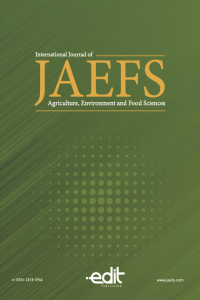First record of the pest and parasitic intermediate host snail Cochlicella barbara (Linnaeus, 1758) in the south-eastern Anatolia
The objective of the present study is to inform the last distribution of the invasive and harmful species Cochlicella barbara (Linnaeus, 1758) in Turkey, as well as to draw attention to the possible danger of this distribution on regional vegetation, agriculture, and parasitism. C. barbara was found for the first time in south-eastern of Anatolia in April 2019 in the campus area of the Dicle University in Diyarbakır, Turkey. C. barbara is admitted as a harmful organism and classified as an agricultural pest in most of the countries. Species in this genus have been intercepted in postal packages, soil, and cargo as well as can be easily transported with plants, building materials, household goods, etc. Above all, it is an intermediate host of nematode and fluke parasites of livestock. Knowing the distribution of this species will not only contribute to the registration of a new species in the list of gastropods of the region but also facilitate the control of the species across Turkey.
Keywords:
Cochlicella barbara, Intermediate host Pest snail, Diyarbakır,
___
- Andrew. B., David. G. (2003). Field prevalence and laboratory susceptibility of southern Australian land snails to Brachylaima cribbi sporocyst infection. Parasite (Paris, France), 10, 119-25. Doi: 10.1051/parasite/2003102119.
- Baker, G.H. (1986). The biology and control of white snails (Mollusca: Helicidae), introduced pests in Australia. CSIRO (Australia) Division of Entomology, 25, 1-31.
- Baker, G.H. (2002). Helicidae and Hygromiidae as pests in cereal crops and pastures in Southern Australia. In: Barker GM, editor. Molluscs as crop pests. New York, USA: CABI publishing.
- Cook, L.M. (1997). Geographic and ecological patterns in Turkish land snails. Journal of Biogeography, 24, 409-418.
- Ekin, İ., Şeşen, R. (2018). A new record of three-band garden slug Ambigolimax valentianus (A. Férussac, 1822) (Gastropoda: Limacidae) from Turkey. Turkish Journal of Zoology, 42, 475-479. Doi:10.3906/zoo-1712-34.
- Godan, D. (1983). Pest slugs and snails. Biology and control. Springer-Verlag Berlin Germany, 445 pp.
- Gu, H., Fitt, G.P., Baker, G.H. (2007). Invertebrate pests of canola and their management in Australia: A review. Australian Journal of Entomology, 46, 231-243.
- Herbert, D.G. (2010). The introduced terrestrial mollusca of South Africa. SANBI, Biodiversity Series, 15, 117 pp.
- Kerney, M.P., Cameron, R.A.D. (1979). A Field Guide to the Land Snails of Britain and North-West Europe. William Collins Sons and Company Ltd., London, 288 pp, 24 pls.
- Larbaa, R., Soltani, N. (2013). Diversity of the terrestrial gastropods in the Northeast Algeria: Spatial and temporal distribution. European Journal of Experimental Biology, 3(4), 209-215.
- Morrondo, P., Díez Baños, P., Mezo, M., Natividad, D., Flores-Calvete, G. (1992). Natural infection of C. barbara (Mollusca) by Protostrongylidae (Nematoda) in paddocks with different grass heights in the northwest of spain: periods of risk for the definitive hosts. Annales de Parasitologie Humaine et Comparée, 67, 180-187.
- Morrondo, P., Lopez, C., Diez-Banos, N., Panadero, R., Suarez, J.L. Paz, A., Diez-Banos, P. (2005). Larval development of Neostrongulus linearis (Nematoda, Protostrongylidae) in the mollusk C. barbara infected and maintained in a subhumid area (north-west Spain) and its possible influence on the infection of small ruminants. Parasitology Research, 97(4), 318-322.
- Roth, B., Hertz, C. (1997). Recent records of Cochlicella barbara (Linnaeus, 1758) in southern and central California. Festivus, 29, 81-83.
- Schutt, H. (2005). Turkish Land Snails 1758-2005. 4th Revised and Enlarged Edition. Solingen, Germany: Verlag Natur and Wissenschaft.
- Suzanne, C., Kerrie, D. (1999). Laboratory screening of nematodes isolated from South Australia for potential as biocontrol agents of Helicid snails. Journal of Invertebrate Pathology, 74, 55-61. Doi: 10.1006/jipa.1999.4855.
- Vendetti, J.E., Lee, C., LaFollette, P. (2018). Five New Records of introduced terrestrial gastropods in southern California discovered by citizen science. American Malacological Bulletin, 36(2), 232-247. Doi:10.4003/006.036.0204.
- Yayın Aralığı: Yılda 4 Sayı
- Başlangıç: 2017
- Yayıncı: Gültekin ÖZDEMİR
